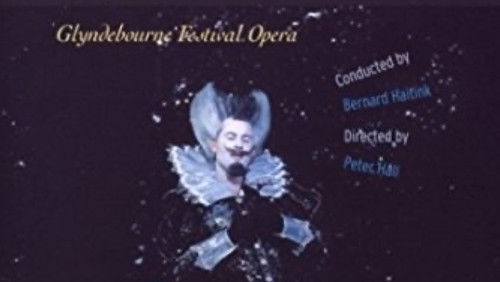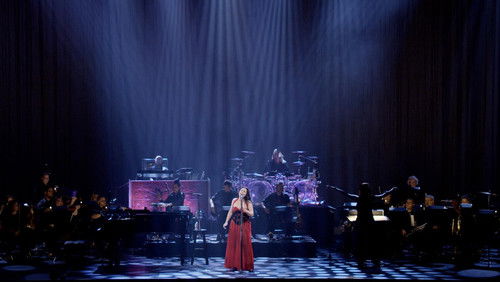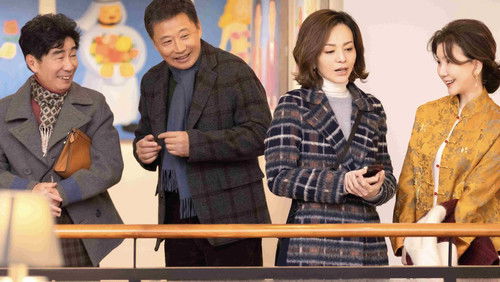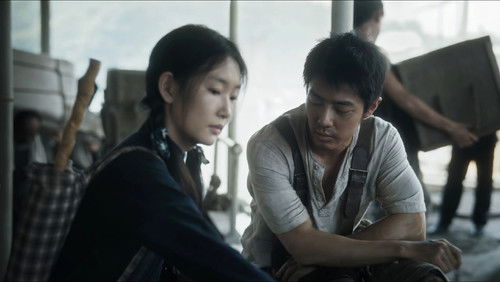Vater dirigiert (1938)
54KVater dirigiert: Directed by Michael Curtiz. With Claude Rains, Jeffrey Lynn, John Garfield, Frank McHugh. Adam Lemp, the Dean of the Briarwood Music Foundation, has passed on his love of music to his four early adult daughters – Thea, Emma, Kay and Ann – who live with him and his sister, the girls’ Aunt Etta, in the long time family home. Of the four, Kay has the greatest promise as a musical performer, specifically as a singer. Theirs is a loving family, however much the girls exasperate their father with their love of popular music, since he loves only the classics, most specifically Beethoven. The girls support each other however they can, but each is an individual with her own distinct personality and wants, including the type of man each wants as a husband. Practical but deep in her heart romantic Emma has long been courted by their next door neighbor, unassuming florist Ernest Talbot, and clever Thea wants to be Mrs. Ben Crowley, he a wealthy up and coming banker with prospects. Only the youngest, the fun loving Ann, states that she doesn’t want to get married. Their collective lives change with the entry into their lives of two men. The first is Adam’s old friend’s son, popular music composer and conductor Felix Deitz, who easily gets a job at the foundation using his natural and sincere charm which he applies to all equally. Many women misconstrue that charm for romantic interest. The second is Felix’s acquaintance, musician Mickey Borden, who he hires to orchestrate his latest composition. Mickey has a chip on his shoulders about what life has dealt him, which he uses in turn as a reason for living a reckless life. The two men make each of the four daughters reexamine what she thinks she wants in life, or more precisely who she wants, which for all may be the same person.
“u0026quot;Four Daughtersu0026quot; begins as just another clone of u0026quot;Little Womenu0026quot; type melodrama. A single father with four musically talented eligible daughters has his hands full trying to keep them in line and guide them in their courting rituals. What turns the film around is the sudden appearance of a new Hollywood star, some critics say the first anti-hero long before James Dean graced the big screen. From the time the dark, foreboding figure of Mickey Borden (John Garfield) appears at Ann Lempu0026#39;s (Priscilla Lane) gate splashing his self-pity and doomed philosophy on the rest of the cast, u0026quot;Four Daughtersu0026quot; becomes much more than just a chick flick.u003cbr/u003eu003cbr/u003eThough Garfield is the main reason to watch u0026quot;Four Daughters,u0026quot; there are other flashes of brilliance to enjoy. Hungarian-born director Michael Curtiz, later responsible for such gems as u0026quot;Casablancau0026quot; and u0026quot;Mildred Pierce,u0026quot; pinpoints certain images with his camera (aided by cinematographer Ernest Haller of u0026quot;Rebel Without A Causeu0026quot; fame) that sticks in the viewers mind, for example the screeching gate that Annu0026#39;s first suitor, Felix Deitz (Jeffrey Lynn), swings on so merrily becomes symbolic of the shifts in moods and affections by those who use it.u003cbr/u003eu003cbr/u003eThat Garfield delivers the standout performance is obvious, but the rest of the cast keeps up with him most of the way. The underrated Jeffrey Lynn plays his role to perfection, as the neglected suitor whose love for his cherished Ann never falters even when sheu0026#39;s with another man. Claude Rains, somewhat miscast as the father of the four coming-of-age young women, gives a fine portrayal of a set upon doting family head who gets lost in the shuffle. The three Lane Sisters, already famous for their musical abilities, turn into accomplished actresses, playing their parts well. A raft of supporting actors, including Dick Foran, Frank McHugh, May Robson, and Eddie Acuff, makes it all believable.u003cbr/u003eu003cbr/u003eHow opposites attract is part of the ploy for touching the quick of the vieweru0026#39;s imagination. Ann is the eternal optimist, even when she and Mickey are down and out. She always looks on the bright side and like so many caught in the pliers of the Great Depression in those days, she saw prosperity just around the corner. Mickey recites an entire list of bad things that have happened to him seeking company in his misery from Ann, which Ann refuses to do. Mickey expects to go out with a bolt of lightning striking him dead as he rounds the corner of life. Mickey has meager talent as a composer; Ann has talent to spare as a singer and musician. Ann is big on beauty; Mickey is big on personality in a warped sense of a way. And the differences go on and on. How all this is reconciled in the end is an important part of the movie, not to be missed.u003cbr/u003eu003cbr/u003eSee u0026quot;Four Daughtersu0026quot; for John Garfieldu0026#39;s doozy of an acting debut on the big screen. The only time he was better came seven years later when he again mesmerized the film goers with one of the greatest screen performances ever, as Frank Chambers in u0026quot;The Postman Always Rings Twice,u0026quot; opposite the equally charismatic Lana Turner. But also watch u0026quot;Four Daughtersu0026quot; to catch important elements that may be missed if too much concentration is placed on the star of the show.”









